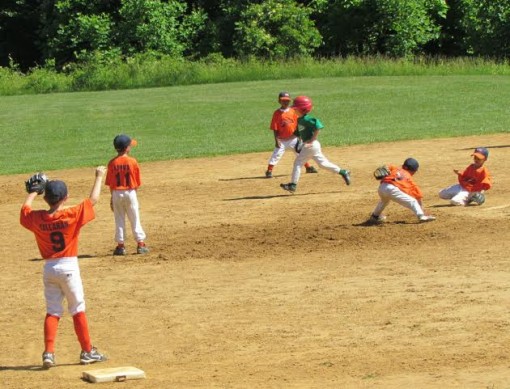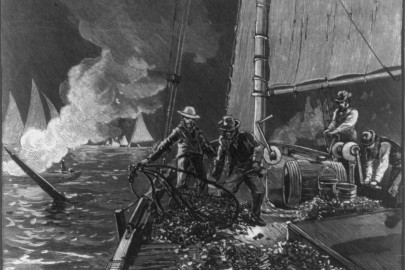
British ex-pat Rita faces up to just how American she has become…
I celebrated my birthday this month and realized that I have now lived in the U.S. for exactly two thirds of my life. My early years in England seem, well, a lifetime away. My England was the England of the 1950’s and 60’s, a place that no longer exists. Sometimes when I read news reports in the British press I just don’t recognize or understand my country. Like the debate about the government’s desire to instill a strong sense of “Britishness” in the populace. Isn’t it a quintessential mark of Britishness to resist such efforts? I can identify with my mother’s feelings about her home country, Belgium. During my childhood she often talked, with a touch of sadness, about how she felt a stranger when she went home for a visit. She left a war-ravaged country struggling to recover from the German occupation. The new prosperous, determinedly bourgeois Belgium was a strange land. But did she feel English? Not really; her accent marked her as a foreigner, though of an indeterminate kind. She was indignant when sometimes mistaken for German. But over the decades there is no doubt that her outlook and interests were shaped more by England than by her homeland.
I may still feel English through and through, my “Britishness” strong enough to pass muster with the present government, but there are times when I must face up to just how American I have become. One such moment occurred on a recent Saturday in a local park as I watched my six-year-old grandson’s baseball game.
The first time I attended a baseball game I took along a book to read. What little I knew about the game suggested I might get bored. I thought baseball seemed a bit too much like cricket, long and leisurely and devoid of the visceral thrills of football or soccer. But I barely opened my book, not to actually follow the game, but to soak in the atmosphere. The stadium we went to, Oriole Park at Camden Yards in Baltimore, is considered a classic of retro-ballpark design. Situated in the former rail yards of the Baltimore and Ohio Railroad’s Camden Station, the ballpark is a model of historic preservation and repurposing. The old warehouse, now team offices, is a massive structure that was once the longest building on the east coast. It looms over the field, a majestic relic of the grand age of American railroads. The view from the stands is magnificent enough to distract from any longueurs in the game. For me the leisurely nature of baseball became a plus, leaving plenty of time to wander the stadium, eat hot dogs, drink beer, and generally soak up the atmosphere of families enjoying a sunny afternoon out in a beautiful setting. The news from England at the time was full of accounts of football hooliganism.
My son played youth baseball – I still remember the thrill of his one and only home run. The surprising crack as his bat connected with the ball, the cheers as the ball soared out over the fielders’ heads, the cloud of dust as he skidded into home plate, the lump of parental pride in my throat. These are the sights and sounds and emotions of baseball that inspire American writers to wax rhapsodic in a way they don’t for any other sport. The heroic ballad Casey at the Bat, first published in 1888, is one of America’s best-loved poems. The essays of Roger Angell and Red Smith, The Boys of Summer by Roger Kahn, and Moneyball by Michael Lewis are just some of the classics of baseball writing. Even George Will, the surly and out of touch columnist for The Washington Post, goes all soft and cuddly when he writes about baseball. The game seems to represent all that is best about America, an idealized past that can live again whenever and wherever a baseball game is played.
So on a recent Saturday I rose early and drove out to a neighborhood park to watch my grandson’s final game of the season. It was a quintessential American scene. Parents and grandparents gathered around the diamond in folding chairs, dads coaching the teams, younger siblings playing catch on the sidelines to emulate their older brothers. And on the field little boys, somehow heartbreakingly beautiful in miniature versions of the uniform, white pants, long colorful socks, baseball caps obscuring their features so they seemed less individuals than iconic figures evoking a timeless American summer. I felt that lump in my throat again, proof, if any were needed, that I am now an American.












Kids have always played baseball and other popular sports, but perhaps not in front of so many parents and friends watching faithfully in the stands. I don’t recall my parents ever taking in one of my games, but today, any parent who misses one of his child’s games is expected to feel guilty and usually will. Organized minor sports, especially national sports, are replacing churches as the focus of family and community cohesion. In many Canadian towns and suburbs, decaying, empty churches stand beside modern, busy, well-maintained hockey arenas. I think it’s about more than just fun and exercise or the unrealistic lure of professional fame and fortune (although sociopathic coaches and parents are definitely a problem). It’s become about character development and moral discipline in counterpoint to an educational system with so much emphasis on feel-good psychological “caring”. Competitive sports is one of the last areas where young kids have to confront striving, achievement, competition and character expectations or else they fail. A lot of parents will acquiesce in their child’s coach’s exhortations, criticisms and disciplines delivered in ways they would not accept from his or her teachers.
Even realistic parents often invest huge amounts of time and money in their child’s minor sports career. I once asked a heavily-committed couple why they did so, as they were not under any illusions about professional success. Their reply was that they figured they has a choice: their son could either hang out around hockey arenas or around shopping centres.
Some of the explosion of organized youth sports has to do with middle class mothers going to work. During the US baby boom, most of them didn’t, and they could keep a loose but adequate watch on the after school games in the back yard. In my neighborhood there wasn’t baseball, only whiffleball, for there was too little space and too much window glass; mostly it was kickball, touch football, tag, etc. With fewer mothers looking out the windows, kids need organized supervision after school, which commonly is done indoors. So sports will be organized.
An excellent post, Rita, and it comes at a most opportune moment.
We are now in the midst of that second most American of sports, our quadrennial round of “This Time, Americans Really Will Come To Love Football.” I haven’t followed that closely, but apparently the general debate has devolved into two sub-debates: should Germany and the US agree explicitly to fight to a draw so that both advance, or just tacitly; and is biting allowed in football.
That ‘we-both-need-a-draw’ Prisoner’s Dilemma thing never goes smoothly.
Ann Coulter has dusted off her gloriously bonkers piece about how any interest Americans might have in the progress of their team in the World Cup symbolises the nation’s moral decay…
http://www.clarionledger.com/story/opinion/columnists/2014/06/25/coulter-growing-interest-soccer-sign-nations-moral-decay/11372137/
Association Football is primarily a middle class children’s sport in the US, and the middle class isn’t a reliable source for the best athletes. There are too many music lessons, too much AP homework, and so on to preoccupy them. And for all the Central American immigrants who are out there kicking it around, I think that the game is in the same position it occupied ca. 1920, when Lou Gehrig was browbeaten by classmates into dropping soccer for baseball.
And as far as I can tell, spectator sports are mostly about what you watched with your father at an impressionable age. A few weeks of games every four years will have a hard time competing with every Sunday every fall.
Soccer occupies a similar position in Australia as it does in the US – a sizeable minority sport that becomes more widely interesting every four years because there’s this terrific global spectacle (much as rowing becomes interesting to us Britons every four years when the Olympics is on).
However, I don’t think the Australians go through the quadrennial crisis about whether the World Cup is a threat to their civilisation, or whether there is something inherently commie in the sport itself. But that’s them crazy Yanks for yer, it’s always All About Them, innit.
Re the production of soccer talent, apparently no less than five members of the current US team grew up in Germany on military bases. That suggests the importance of coaching at a young age (in a country where they take it seriously, rather than where it’s a middle class kiddie pastime).
apparently no less than five members of the current US team grew up in Germany on military bases.
Now there’s the argument for why Americans should embrace soccer: it’s our duty as global military hegemon and thus part of American exceptionalism.
As far as I can see, the quadrennial crisis is no more severe than that brought on by the 5-meter air pistol competition of the Summer Olympics. No doubt Ann Coulter could write a column on how that competition is ruining the moral fiber so painfully spun by Natty Bumpo and Alvin York, and perhaps the Jackson Clarion Ledger would print it.
‘Soccer is UnAmerican’ is definitely another meme in the great Culture War, George.
Good point about the middle class, George. I’m normally a fan of the middle class, but we sure can be neurotic when left to our own devices. Coutler’s screed is a lttle tired, but her crack about ribbons and juice boxes is a classic.
I don’t think the Australians go through the quadrennial crisis about whether the World Cup is a threat to their civilisation
Brit, I’m surprised a literate Pom could write such a hilarious sentence with a straight face.
A timely post Rita even if this is a belated comment. The observations on soccer as primarily a middle class kids sport are all very true but I’d like to point out that for those of us who grew up as rugby union players then things are more embarrassing still. When by sons friends parents discover I’m a Brit they assume I’ve a genetic predisposition to soccer genius and as such should coach there little angels. I actually have little talent for the game and even less interest. I coached one season but happily Banished Jr. Hated the game and I was saved further soccer related tedium. However now whenever I truthfully admit my rugby background I get the same reply
“Oh yeah , my sister played rugby in college “
I’d no idea “The Boys of Summer” was about baseball: I looked through Don Henley’s lyric and found no reference thereto. Is it a code-phrase that all Americans understand, just as “The Beautiful Game” signifies Association Football to most Brits?
Talking of Soccer, I’m amused by references to Americans’ lack of interest in the game, and references to the Beckhams and their short spell in the USA. I am one of a minority of Brits who also disdain the game.
Yes. Yes it is.
http://www.urbandictionary.com/define.php?term=boys%20of%20summer
Thanks, David: I’ll listen to Don in a new light.
There is a strain of conservative French culture that sees football as unFrench, the immigrants’ game. It wilted in the face of the World Cup win of ’98 but I gather it’s still about.
(Perhaps surprisingly, rugby doesn’t have the same foreign, imported feel – largely because it’s so embedded in the life of the villages of the south.)
Anyhow, I guess the question is whether France and the US are two nations divided by a common form of nationalism. Someone tell Anne Coulter.
this was very enjoyable Rita, many thanks
Thanks for this article. I’d also like to convey that it can always be hard if you find yourself in school and starting out to initiate a long history of credit. There are many college students who are only trying to live and have long or good credit history can often be a difficult thing to have. fkadegdekaeg